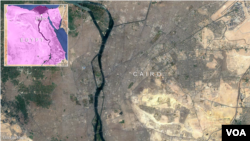Egypt's economic prospects are looking brighter after the long-anticipated production of undersea gas from the al Zohr gas field began coming online in recent days.
Petroleum Minister Tareq al Molla tells Arab media the al Zohr field will be a major boon for the economy, saving $750 million to possibly several billion dollars a year in energy costs.
He says that the giant al Zohr gas field has a reserve of 30 trillion cubic feet and the first phase of production of 1.2 billion cubic feet per day is expected to be reached around mid 2018, with production being ramped up to 2.7 billion cubic feet per day by mid- to late 2019.
Italy's ENI petroleum company is heading production of the al Zohr field, while the BP company is overseeing production of another large undersea gas field off Egypt's Nile Delta region, known as al Nooros.
Al Molla told Egyptian media the al Nooros field presents an unexpected bonus.
Al Molla said he was expecting a production of 350 million cubic feet per day [from the al Nooros field], but production has reached 1.1 billion cubic feet per day, which came as a pleasant surprise.
Natural gas use
Egyptian consumers use natural gas for cooking, heating and running natural gas-powered vehicles. The government is also planning to produce more electricity with natural gas powered plants, now that water levels on the Nile are in danger of dropping from construction of a new dam in Ethiopia. Egypt's Aswan High Dam produces electricity from Nile water.
Egyptian President Abdel Fattah el Sisi recently met with the leaders of Cyprus and Greece to discuss the prospects of economic cooperation, as Cypriot undersea gas is also brought online. Prospects of laying an undersea pipeline to Greece and exporting gas to Europe were also discussed.
He says the discovery of energy in the eastern Mediterranean could be an important factor in achieving stability and peace, in addition to the fact that these discoveries could supplement the energy needs of Europe and diversify its energy sources, adding to the strategic importance of countries like Egypt and Cyprus.
Contractual arrangements give Egypt 40 percent of the revenue from the al Zohr.
Georgetown University adjunct professor Paul Sullivan is cautious about Egypt's natural gas windfall, telling VOA estimates of possible reserves are sometimes off the mark.
"What is actually in place is not the same amount of natural gas that can be taken out, and if they are talking about 500 million cubic feet per day, it could be 350, it could be 500, it could be 600," Sullivan said. "There are lots of geological and other things that happen and pressures change, and frankly, inside of gas fields, it is hard to tell exactly what you are going to get out of them within five to 10 years."
Sullivan says that al Zohr is "one of the biggest fields in the world discovered in the past 20 years," but he added, "There is also a lot of competition in the area," which could depress prices in the regional market. Israel has already been producing gas from its undersea natural gas reserves for some time, and Lebanon and Cyprus are in various stages of starting production.





